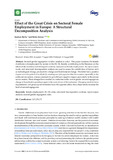Mostrar el registro sencillo del ítem
Effect of the great crisis on sectoral female employment in Europe: a structural decomposition analysis
| dc.creator | Barba, Izaskun | es_ES |
| dc.creator | Iraizoz Apezteguia, Belén | es_ES |
| dc.date.accessioned | 2021-06-14T11:17:39Z | |
| dc.date.available | 2021-06-14T11:17:39Z | |
| dc.date.issued | 2020 | |
| dc.identifier.issn | 2227-7099 | |
| dc.identifier.uri | https://hdl.handle.net/2454/39914 | |
| dc.description.abstract | Sectoral gender segregation in labor markets is a fact. This paper examines the female distribution of employment by sectors in the EU 28, thereby contributing to the literature on the effects of the recession and subsequent austerity measures on female employment. An input-output model and structural decomposition analysis are used to assess the contribution of factors such as technological change, productivity change and final demand change. The latter had a positive impact over the period of analysis by creating new job opportunities for women, especially in the public service sectors, whereas productivity growth had a negative impact, particularly in the private service sectors. These changes have resulted in a reduction in the level of gender sectoral segregation; change in household expenditure again is the main driver of this reduction. Changing trends in labor requirements and gross capital formation have the opposite effect; thus, these trends increase the level of sectoral segregation. | en |
| dc.description.sponsorship | This work was supported by the Spanish Ministry of Economy and Competitiveness (Project ECO2016-76681-R). | en |
| dc.format.extent | 24 p. | |
| dc.format.mimetype | application/pdf | en |
| dc.language.iso | eng | en |
| dc.publisher | MDPI | en |
| dc.relation.ispartof | Economies, 2020, 8, 64 | en |
| dc.rights | © 2020 by the authors. Licensee MDPI, Basel, Switzerland. This article is an open access article distributed under the terms and conditions of the Creative Commons Attribution (CC BY) license. | en |
| dc.rights.uri | http://creativecommons.org/licenses/by/4.0/ | |
| dc.subject | Crisis | en |
| dc.subject | EU-28 | en |
| dc.subject | Female employment | en |
| dc.subject | Input-output analysis | en |
| dc.subject | Sectoral gender segregation index | en |
| dc.subject | Structural decomposition analysis | en |
| dc.title | Effect of the great crisis on sectoral female employment in Europe: a structural decomposition analysis | en |
| dc.type | info:eu-repo/semantics/article | en |
| dc.type | Artículo / Artikulua | es |
| dc.contributor.department | Institute for Advanced Research in Business and Economics - INARBE | es_ES |
| dc.contributor.department | Economía | es_ES |
| dc.contributor.department | Ekonomia | eu |
| dc.rights.accessRights | info:eu-repo/semantics/openAccess | en |
| dc.rights.accessRights | Acceso abierto / Sarbide irekia | es |
| dc.identifier.doi | 10.3390/ECONOMIES8030064 | |
| dc.relation.projectID | info:eu-repo/grantAgreement/ES/1PE/ECO2016-76681-R | en |
| dc.relation.publisherversion | https://doi.org/10.3390/ECONOMIES8030064 | |
| dc.type.version | info:eu-repo/semantics/publishedVersion | en |
| dc.type.version | Versión publicada / Argitaratu den bertsioa | es |



